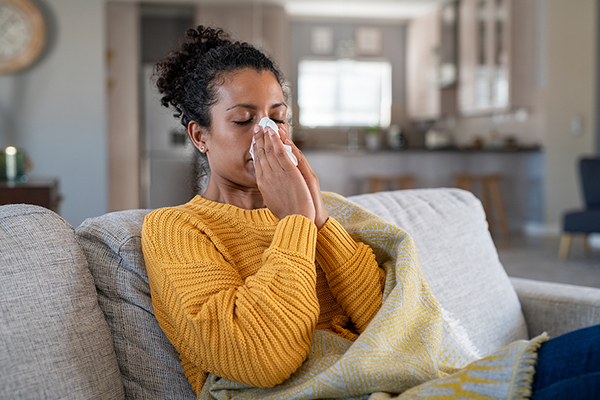‘Tis the season for sniffling, sneezing and wheezing, but how can you tell the difference between allergies or a sinus infection?
Sinusitis, or a sinus infection, occurs when one or more of your sinuses become inflamed or swollen. The irritation causes fluid to collect in the sinuses, making it easier for viruses or bacteria to grow.
The Sinusitis-Allergy Connection
Sinusitis is related to allergies because people with allergies are at an increased risk of developing sinusitis. This is because breathing in irritants, such as dust, mold or pollen, can cause swelling and irritation in the sinuses. It’s important to know the difference between an allergic reaction and a sinus infection to ensure you receive the right treatment.
Signs and Symptoms: How to Spot the Difference Between Allergies or a Sinus Infection
One of the key differences between allergies and a sinus infection is the timing of symptoms. While allergy symptoms usually subside soon after the allergen is gone, sinusitis will be persistent with symptoms lasting longer than a few weeks.
Most cases of sinusitis are viral infections, meaning they run their course and go away without further treatment. Allergies will cause symptoms as long as the allergen is present.
Here are some other differences to look out for:
Signs of Allergies
- Runny or stuffy nose
- Sneezing
- Watery, itchy eyes
Signs of a Sinus Infection
- Headache or pressure felt near the sinuses (forehead, eyes and/or cheeks)
- Stuffy nose with thick and colored mucus
- Sore throat, sometimes with a cough
How to Prevent Sinus Infections When You Have Seasonal Allergies
If you have allergies, preventing a sinus infection is especially important. Avoiding allergy triggers will not only help you avoid sinusitis, but it can help alleviate symptoms as well.
- If your allergies are seasonal, monitor pollen and mold counts outdoors, and stay inside when the counts are high.
- Keep your doors and windows closed to prevent allergens from getting inside.
- Shower and wash your hair before going to bed to get any pollen, dust or dander off your body.
- Wash your clothes and bedding frequently to remove any lingering allergens.
- Work with an allergy-immunology specialist, who can help treat your allergy symptoms and prevent flare-ups before they happen.





